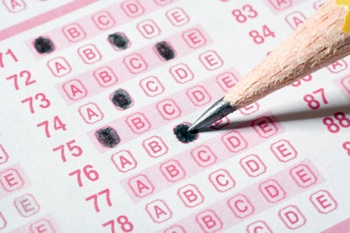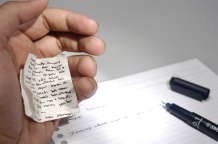A comprehensive report in late March by the Atlanta Journal-Constitution provides strong evidence that adults in as many as 200 school systems have been cheating on their students’ standardized tests.
We looked at this for NewsHour in 2011:
Because I spent three years chronicling the tenure of Michelle Rhee in Washington, DC — another city with a spate of thus-far-unexplained ‘wrong to right’ erasures on standardized tests — I am interested in this story. I’d like to know if anyone cheated in the DC schools. If so, who and why?
But a teacher I correspond with occasionally brought me up short recently. My focus on actual, literal cheating — physically changing answers or giving kids answers in advance — is too narrow, this teacher wrote.
Here’s part of a recent letter:
“While I know that the cheating scandals may be considered important, I’m frankly a bit disappointed that this is the focus because the cheating scandal doesn’t really matter in terms of the students and their futures, which should always be the focus of anything related to education. What matters is the lasting damage that is being done to them as a result of the increased pressures being put on the school system over these tests. The lasting damage is the closing of schools with no thoughts as to the repercussions on the community, the constant rotating principals, the removal of teachers connected with the community, the privatization of public schools and property, the fact that schools budgets are getting slashed while the administrative central office expands and gives money to private contractors in huge quantities that accomplish nothing, the constant lack of knowledge about our future in the schools, the increasing class sizes and removal of resources from our neediest schools, etc. The cheating scandal is next to nothing; that is a product of the testing obsession as a whole, something that Michelle Rhee certainly fed, but it is far from the worst part of her tenure. Those test scores mean nothing about how prepared our children are for their futures–whether or not there was cheating.”

Supporting her argument that the real issue is preparing kids for their futures is a new report about the arts in our schools, hard data confirming what most reporters have known for a long time: for at least 10 years, the arts have been disappearing from schools populated largely by low-income kids. The report is from the U. S. Department of Education. It tells us that fewer public elementary schools today offer visual arts, dance and drama classes, a decline many attribute to budget cuts and an increased focus on math and reading. Most high schools with large numbers of low income students do not offer music. Dan Domenech, executive director of the American Association of School Administrators, told reporters that cuts are likely to continue into the next two years because education funding has been slow to pick back up. “We haven’t hit bottom yet,” he said.
In other words, we’re cheating kids on their tests and stealing essential courses like art and music from them! Add to that, we are lying — because when kids get phony scores telling them they are proficient when they need help, that’s an out-and-out lie.
At what point does this trifecta — lying, cheating and stealing — become a felony? Seriously!
In the face of this disheartening news, one has to ask, “who benefits?” I’m stumped. Certainly not children, parents and teachers. Could it be the testing companies? Perhaps it’s the bevy of expert ‘consultants’ who advise school systems on how to raise test scores, how to calculate the ‘value added’ that individual teachers provide, and how to make education more ‘businesslike’ and efficient?
A far more important question than ‘who benefits?’ is: What are we going to do about it?

